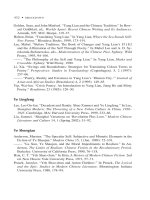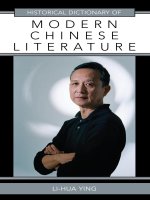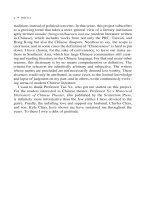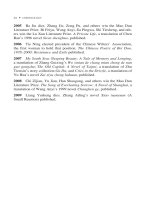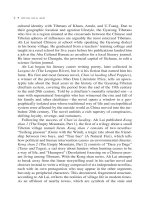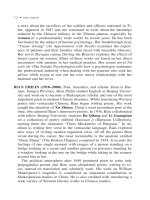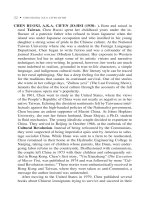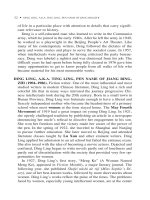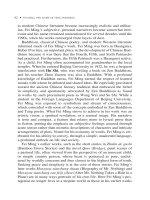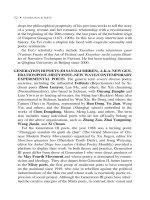"Historical Dictionary of Modern Chinese Literature" by Li-hua Ying - Part 7 potx
Bạn đang xem bản rút gọn của tài liệu. Xem và tải ngay bản đầy đủ của tài liệu tại đây (92.45 KB, 10 trang )
of life in a particular place with attention to details that carry signifi-
cant relevance to history.
Deng is a self-educated man who learned to write in the Communist
army, which he joined in the early 1940s. After he left the army in 1949,
he worked as a playwright in the Beijing People’s Art Theater. Like
many of his contemporary writers, Deng followed the dictates of the
party and wrote stories and plays to serve the socialist cause. In 1957,
when intellectuals were purged for having criticized the party bureau-
racy, Deng was labeled a rightist and was dismissed from his job. The
difficult years he had spent before being fully cleared in 1976 gave him
many opportunities to get to know people from all walks of life who
became material for his most memorable works.
DING LING, A.K.A. TING LING, PEN NAME OF JIANG BING-
ZHI (1904–1986). Fiction writer. One of the most influential and most
studied writers in modern Chinese literature, Ding Ling led a rich and
colorful life that in many ways mirrored the journey progressive Chi-
nese intellectuals took during the 20th century. Born in a small town in
Hunan Province, Ding Ling was fortunate enough to have a liberal and
fiercely independent mother who became the headmistress of a primary
school when most women at the time stayed home. The May Fourth
Movement of 1919 had a great impact on young Ding Ling. In 1921,
she openly challenged tradition by publishing an article in a newspaper
denouncing her uncle’s refusal to dissolve her engagement to his son.
She won her freedom and the victory made her aware of the power of
the pen. In the spring of 1922, she traveled to Shanghai and Nanjing
to pursue further education. She later moved to Beijing and attended
literature classes taught by Lu Xun and other eminent writers. Ding
Ling applied for admission to an art school but failed the entrance exam.
She also toyed with the idea of becoming a movie actress. Dejected and
confused, Ding Ling began to write novels partly out of loneliness and
partly out of dissatisfaction with the society that provided very few op-
portunities for women.
In 1927, Ding Ling’s first story, “Meng Ke” (A Woman Named
Meng Ke), appeared in Fiction Monthly, a major literary journal. The
following year, she published Shafei nüshi de riji (Miss Sophie’s Di-
ary), one of her best-known works, followed by more short stories about
women. Ding Ling’s works reflect the pulse of the times. The problems
faced by women, especially young intellectual women, are at the center
32 • DING LING, A.K.A. TING LING, PEN NAME OF JIANG BINGZHI
of her stories. “Meng Ke,” Shafei nushi de riji, and another story, “Shu-
jia zhongxin” (Summer Vacation), are all about the new generation of
educated women who emerged after the May Fourth Movement. Shafei,
for example, rebels against her family and its feudal ethics in pursuit of
love and the meaning of life on her own terms. Mao Dun, a powerful
critical voice of the time, remarked that Shafei is “representative of the
rebellious young women who are abused and injured by the times.”
With an impressive body of works, Ding Ling quickly became a rising
star. In 1932, she joined the Left-wing Association of Chinese Writers
and the Communist Party the following year, thus beginning her lifelong
association with the Communist cause.
“Tianjiachong” (Tianjiachong Village), a short story published in
July 1931, marked a transition in Ding Ling’s literary career. She re-
places the self-absorbed, sentimental bourgeois heroine portrayed in
her early works with the socially engaged, politically active intellectual
woman. The protagonist of this story is an educated young woman from
a landed family who goes to a rural village to educate and mobilize
the peasants. For the first time in her writing career, Ding Ling places
an educated woman in the midst of the working class, depicting her
role in the communist revolution. As Ding Ling became increasingly
devoted to communism, her writing became more dominated by ideol-
ogy. Between 1931 and 1933, Ding Ling wrote 11 short stories on the
miserable conditions of the workers and peasants and their rebellious
struggles guided by the Communist Party. Ding Ling abandoned the
gloomy sentiments displayed in her earlier works and instead embraced
an optimistic outlook. These stories were considered important achieve-
ments for the left-wing literary movement and subsequently made Ding
Ling a target of the Nationalist government. In May 1933, she was
abducted and spent three years in captivity in a secret location before
finally managing to flee in September 1936 to the Communist base in
northern Shaanxi.
Ding Ling’s arrival in the Communist-held region began a new chap-
ter of her life. She was warmly greeted by the leaders of the Commu-
nist Party and soon developed friendships with Mao Zedong and other
high-ranking officials and generals. After the Japanese invasion, Ding
Ling’s work revolved around the war effort. She wrote for and edited
newspapers and literary journals in an attempt to mobilize the masses
and boost morale. The most representative of her writings in this period
are seven short stories, including “Wozai xiacun de shihou” (When I
DING LING, A.K.A. TING LING, PEN NAME OF JIANG BINGZHI • 33
Was in the Xia Village). While the country was still embroiled in the
Civil War, Ding Ling joined a land reform work team in the Commu-
nist-controlled north. She immersed herself in the life of the peasants,
making investigations, visiting the poor, and participating in their work.
She accumulated firsthand material that would later be used to write
Taiyang zhao zai Sanggan he shang (The Sun Shines over the Sanggan
River), a novel about the complexity of land reform, which won the
Soviet Union’s Stalin Prize (second place) in 1951.
After the founding of the People’s Republic of China, Ding Ling
held many official positions, including party secretary of the National
Writers’ Association and director of the Literary and Art Division of
the Propaganda Ministry. The articles, essays, commentaries, and some
short stories she wrote during this period received little critical notice
and in the late 1950s Ding Ling was exiled to remote farms until 1977,
when she was restored to her former positions and returned to Beijing.
See also SINO-JAPANESE WAR; WOMEN.
DING XILIN (1893–1974). Playwright. Trained as a scientist, Ding Xilin
was a rare case in Chinese literary circles. He was a student of physics
and mathematics at the University of Birmingham from 1914 to 1920
and taught physics at universities in China throughout his life. After
1949, he held several official titles: representative to the People’s Con-
gress, vice minister of culture, director of Beijing Library, and member
of the standing committee of the Association of Chinese Playwrights.
Ding was interested in literature at a young age, but it was his so-
journ in Great Britain that gave him the opportunity to read a wide
variety of Western works that inspired him to write plays. In the 1920s,
Ding was arguably the greatest playwright on the stage of aimei ju
(the amateur play), a precursor to the modern spoken drama. His first
play, Yizhi mafeng (A Wasp), a romantic comedy written in 1923, pokes
fun at social taboos that prohibit young people from finding their own
marriage partners. Its success motivated him to produce more works:
Qin’ai de zhangfu (Dear Husband), Jiu hou (Flushed with Wine), Yapo
(Oppression), and Xia le yizhi yan (One Eye Blinded), all written in the
1920s. He continued to write in the 1930s and 1940s, and his last work
came out in 1961. In addition to Yizhi mafeng, his best-known plays
are Yapo, about two young people pretending to be married in order to
satisfy the landlord who refuses to take in unmarried young tenants,
and San kuai qian guobi (Three Dollars), which features a university
34 • DING XILIN
student showing his indignation at a rich lady who demands from her
servant a payment of three dollars for having broken her vase. Ding
wrote mostly one-act comedies, satirizing the small injustices and so-
cial conventions in everyday life. Although they contain evidences of
leftist ideology, his plays are subtle in their message and focus on class,
gender, and generational conflicts. Ding prefers a simple plot, unex-
pected resolution, and a humorous but elegant vernacular language to
create comic moments.
Ding was a man of many talents. Other than his profession as a physi-
cist and his success in the theater, he also dabbled in language reform,
having invented a system that uses character strokes for looking up
words in a dictionary, a system that has been put to new use for entering
Chinese characters with a computer.
DONG QIZHANG, A.K.A. DUNG KAI CHEUNG (1967– ). Fiction
writer. Born and raised in Hong Kong, Dong Qizhang received his
master’s degree in comparative literature from Hong Kong University.
One of the most talented writers coming out of Hong Kong, Dong has
produced an impressive output of works, most of which are novellas
and novels. He is the recipient of numerous awards, including Taiwan’s
prestigious Unitas Literature Award.
His first award-winning novella “Anzhuo zhenni” (Androgyny)
describes a female scientist who runs away from an unhappy marriage
and lives in a remote mountain to research a rare type of lizard. As a
modern, independent woman with strong feminist beliefs, she rejects
the traditional role expected of her and refuses to be a “baby-mak-
ing machine,” a role into which her loveless marriage has essentially
reduced her. Dong devotes a good amount of pages to the nature and
habits of the androgynous lizard, which represents the woman’s radical
feminist position: without relying on men to reproduce, women could
forever forsake male oppression and become truly independent. Af-
ter the success of “Androgyny,” Dong continued to explore gender
identity in Shuang shen (A Hermaphrodite), a novel reminiscent of
Virginia Woolf’s Orlando. The protagonist wakes up one morning to
find himself metamorphed into a female body and in so doing he/she
gains a unique perspective into the multiplicity of human nature. In
deconstructing the conventional ideas of gender differences, the novel
makes references to Chinese myths about animals that embody both the
yin and the yang.
DONG QIZHANG, A.K.A. DUNG KAI CHEUNG • 35
Dong’s novels are ambitious in terms of both scope of subjects and
degree of innovation. Although they are rooted in Hong Kong reali-
ties, Dong is more interested in examining universal issues within his-
tory—not just human history but the history of the universe. The sheer
vastness of intellectual territory his novels encompass is breathtaking
and unprecedented in modern Chinese literature. Tian gong kai wu:
Xuxu ru zhen (The Beginning of Things: The True Life of Xuxu) and
Shijian fan shi: Yaci zhi guang (A Complex History of Time: Yaci’s
Light), parts one and two of his Ziran shi sanbuqu (Trilogy of a Natu-
ral History) represent such a multicourse feast (part three is yet to be
published). These novels are set in Hong Kong but the issues covered
in them are undoubtedly universal. What concerns Dong is human be-
havior in the material work and individual conduct in the development
of civilizations. He studies material culture by looking at how the radio,
telephone, sewing machine, automobile, typewriter, camera, book, and
other daily goods have been invented and made and their relationship
with the individual, the family, and the city. Through the portrayal of the
life and work of the writer/protagonist, he also examines the dynamics
between the creator/writer and the created/character.
Often characterized as postmodern, Dong’s works are influenced by
Jorge Luis Borges and Italo Calvino. Like these masters, Dong loves
to push the limits of novel writing to the extreme. He sets out to break
barriers between different genres, mixing, in his cauldron of fiction,
scientific, philosophical, literary, sociological, and political discourses.
Part of the reason that he stretches across so many fields is that each new
discovery stimulates his imagination, renews his creativity, and provides
a refreshing angle from which to examine the world around him.
DUANMU HONGLIANG, PEN NAME FOR CAO JINGPING
(1912–1996).
Fiction writer, playwright, and essayist. Born in Liaon-
ing Province in northeast China, Duanmu Hongliang began writing
fiction while studying history at Qinghua University in Beijing. Along
with Xiao Hong, to whom he was briefly married, Xiao Jun, and other
young writers from the Japanese-occupied Manchuria, Duanmu fled
his homeland and wandered throughout China during the war years. He
joined the Left-wing Association of Chinese Writers and became one
of its most prominent voices.
Before 1949, Duanmu wrote mostly fiction. He aimed at capturing the
spirit of his homeland by emphasizing its natural beauty and its hardy,
36 • DUANMU HONGLIANG, PEN NAME FOR CAO JINGPING
earthy people. Duanmu is known for his passion for the land and the
poetic language he uses to describe it. The work that best characterizes
his art is his first novel, Kerqinqi caoyuan (The Khorchin Grassland),
published in 1933. The book relates the rise and fall of a landed family
on the eve of the Japanese invasion. Praised for its use of local dialect
and its depiction of life in the northeast, the novel garnered admiration
from important figures in the community of progressive intellectuals.
Other notable works include his first short story, “Cilu hu de youyu”
(The Sorrows of the Egret Lake), which depicts life in the northeast
under Japanese occupation, “Liming de yanjing” (Eyes of Daybreak),
and “Zao chun” (An Early Spring), about simple country folks. After
1949, Duanmu wrote mostly plays and political and literary essays. His
most noteworthy accomplishment during the period is a fictionalized
biography of Cao Xueqin, author of the most prominent novel in clas-
sical Chinese literature, Hong lou meng (A Dream of Red Mansions).
Duanmu died as he was working on the third volume. See also SINO-
JAPANESE WAR; SPOKEN DRAMA.
DUO DUO, PEN NAME OF SU SHIZHENG (1951– ). Poet. Born
and raised in Beijing, Duo Duo spent two years in rural Hebei during
the Cultural Revolution. As one of the main Misty poets, Duo Duo
has gone through many changes in his life and in his art. A founding
member of the Today group, along with Bei Dao and Mang Ke, Duo
Duo rose to fame in the 1980s but was forced to leave China in June
1989 when the Chinese government cracked down on the Tian’anmen
Prodemocracy Movement with which Duo Duo was associated. Fif-
teen years later, however, he was not only allowed to return to China to
live and teach, but the official Xinhua News Agency honored him with
its 2004 Poet of the Year Award.
Duo Duo’s poetic style has also undergone several changes, from the
terse and cryptic political verse of his early career to the prosaic philo-
sophical lines in recent years. His early experimental poems, such as
“Mi zhou” (Honey Week) and “Zhi taiyang” (To the Sun), written in the
1970s and 1980s, are considered important pieces in the underground
poetry movement, both in terms of style and vision. His later poems,
particularly those written in the 1990s, such as “Guo hai” (Crossing the
Sea), “Tamen” (They), and “Guilai” (Homecoming), while consistent
with the poet’s love for symbols and imageries, pay more attention to
the exploration of the mysteries of life. Many years of living in the West
DUO DUO, PEN NAME OF SU SHIZHENG • 37
have left deep imprints on his poetry. He has dealt with the theme of
exile and alienation and, more important, his sojourn exposed him to
poetic traditions that have produced prominent poets such as Charles
Baudelaire, Sylvia Plath, and others who have influenced his work.
Written exclusively in Chinese, Duo Duo’s poems have been translated
into many languages.
– E –
ERYUE HE, PEN NAME OF LING JIEFANG (1945– ). Novelist.
Born in Xiyang, Shanxi Province, Eryue. After high school, he joined
the army, where he stayed for the next 10 years. Currently he lives in
Henan and is the deputy chairman of the Writers’ Association of Henan.
Arguably the most popular and one of the most commercially successful
writers in China today, Eryue He is a household name, in part because
of the TV movies made from his historical novels. His reputation goes
beyond China to reach all of the major Chinese communities in the rest
of the world. His novels have been reprinted more than a dozen times,
not including a variety of pirated editions. He has won many prestigious
awards, including the Best Historical Novel Prize. His work is based on
China’s dynastic history, specifically the reigns of three Qing emperors:
Kangxi, Yongzheng, and Qianlong, covering 140 years of a powerful
empire. The three novels, Kangxi Dadi (Kangxi: the Great Emperor),
Yongzheng Huangdi (Emperor Yongzheng), and Qianlong Huangdi
(Emperor Qianlong), totaling 10 volumes and taking him 20 years to
write, center on power struggles behind the walls of the imperial court.
At the same time, they unfold a broad canvas of characters from all
walks of life: concubines, officials, scholars, peasants, businessmen,
and many others. Because of their large scope, the novels are consid-
ered encyclopedias of the Qing dynasty. Thoroughly researched, these
novels, while re-creating history, convey the author’s conflicted feelings
about traditional culture; his portrayals of an empire from its youth to
the beginning of its decline reveal a sense of nostalgia and a lamentation
at the irretrievable vitality of a great era. Heavily influenced by classical
Chinese novels, particularly Cao Xueqin’s Hong lou meng (A Dream of
Red Mansions), Eryue He believes that historical novels should be built
on real historical events and enhanced through imaginative treatment of
circumstances.
38 • ERYUE HE, PEN NAME OF LING JIEFANG
– F –
FAN WEN (1962– ). Fiction and prose writer. Born in Zigong, Sichuan
Province, Fan Wen received a B.A. in Chinese from Southwestern
Education University in 1985. A member of the Chinese Writers’ As-
sociation, Fan currently lives in Kunming and is the associate editor
of Wenxue jie (The Literary Field). His early works, mostly fiction,
began to appear in 1986, with a majority of the stories depicting con-
temporary Chinese life and novels portraying historical figures and
events. His 1999 novel, Qing guan Hairui (Hairui: An Honest Offi-
cial), is based on a well-known Ming dynasty scholar-official. Fan’s
fame, however, rests largely on two novels about Tibetans and other
ethnic minorities in the southwest, Shui ru dadi (Land of Harmony)
and Beimin dadi (Land of Compassion), both inspired by his numer-
ous trips to Tibet, including the Tibet Expedition sponsored by Yun-
nan Press in 1999 to promote the history and culture of the region.
Fan was especially familiar with an area in Yunnan Province that
borders the Tibetan Autonomous Region, where ancient traders made
their living by journeying between Lhasa and the hinterland through
the famous Tea and Horse Route along the narrow valley of the
Lanchang River. Shui ru dadi is set in eastern Tibet in a town called
Yanjin, named after its ancient salt industry, where the Tibetans have
lived side by side with the Naxis, the Chinese, and and others for
hundreds of years. Several religious practices, including Tibetan Bud-
dhism, Dongba, and Christianity, fought oftentimes violently for the
hearts and minds of the locals in the first half of the 20th century. The
novel unfolds a multiethnic, multicultural history hitherto unknown
to many Chinese. Beimin dadi tells of the spiritual odyssey of an ordi-
nary man who becomes a holy monk through extraordinary trials, in-
cluding the deaths of all his loved ones. Influenced by Gabriel García
Márquez and magic realism in Latin American literature, Fan’s nov-
els are imbued with mysterious events and supernatural exploits that
reflect Tibetan beliefs in the supernatural. An amateur anthropologist,
Fan frequently inserts his field research notes, including interviews
and sketches, into the fictional narrative. In addition to his fictional
works, Fan has written two travelogues that also deal with Tibetan
history and culture: Cangmang gu dao: hui bu qu de lishi bei ying
(Endless Ancient Path: Inerasable Shadow of History) and Zangdong
tanxian shouji (Notes of an Expedition in Eastern Tibet).
FAN WEN • 39
FAN XIAOQING (1955– ). Fiction writer. Born and raised in the south-
ern city of Suzhou, Fan Xiaoqing spent several years in the countryside
after high school. In 1977 she entered Jiangsu Teachers’ College as a
Chinese major and four years later joined its faculty. She became a pro-
fessional writer in 1985 and serves at present as the deputy director of
Jiangsu Writers’ Association. Fan is a prolific writer and has received
numerous awards for her short stories and novels. In the 1980s, she was
celebrated for her portrayals of social relationships and lifestyles in the
alleys of Suzhou in such works as Kudang xiang fengliu ji (The Roman-
tic Life in the Crotch Alley) and Lao an (Old Shores), about the life of
rickshaw workers during the beginning years of the post-Mao era. In the
1990s, she turned her attention to examining the muddy waters of Chi-
nese bureaucracy in what has been called her “political novels,” the best
known of which are Nü tongzhi (A Female Comrade), Bai ri yangguang
(One Hundred Days of Sunlight), and Chengshi biaoqing (The Facial
Expressions of a City), all dealing with intricate relationships within
the governmental system that puts the individual’s ideals and moral
standards in direct conflict with the expectations of the political power
structure. The difficult negotiations and compromises her characters
are forced to make in order to survive reveal some of the fundamental
flaws of the system. Fan’s style is generally naturalistic, accessible to
the general readership, and her stories and novels describe characters
and subjects close to everyday contemporary life. She is considered a
“restrained” writer whose views on society and human nature tend to
be moderate, even though her subject matter is often political. Fan also
writes scripts for film and television. See also WOMEN.
FANG FANG, PEN NAME OF WANG FANG (1955– ). Fiction writer.
Fang Fang graduated from Wuhan University where she majored in
Chinese. Often mentioned with Chi Li, another Wuhan writer, Fang is
noted for her “new realist” stories, which present contemporary urban
life with an accessible style. Her novellas Taohua can (Brilliant Are the
Peach Blossoms), Fengjing (Scenery), and Luori (Sunset), among oth-
ers, are all about life in the city of Wuhan. She portrays the difficulties
of survival for the urban poor and the rivalries and distrust that exist
among friends and family. Caught in the midst of abject poverty, her
characters struggle in a spiritual quagmire, out of which they are unable
or unwilling to extract themselves. Economic and social injustice breeds
hatred and distorts human nature so that those few who have managed
40 • FAN XIAOQING
to climb out of their miserable conditions have succeeded only through
dishonorable and ruthless means. In this seemingly hopeless urban
slum, traditional morals struggle to prevail. In her novella Wanjian ch-
uan xin (Ten Thousand Arrows Piercing the Heart), Fang Fang portrays
a flawed character who redeems herself by doing hard manual labor to
provide for her family. Throughout her career since the 1980s, while
depicting urban life, Fang Fang has consistently focused her attention on
women, investigating the disconnect between their dreams and reality.
In the urban slums and the white-collar world, Fang Fang finds multidi-
mensioned women who struggle to come to terms with their emotional
needs under enormous social and economic pressure. The unambiguous
empathy for women and their conditions shown in the stories manifests
the author’s feminist stance.
FEI MA (1936– ), PEN NAME OF MA WEIYI. Poet. Born in Tai-
zhong, Taiwan, Fei Ma moved with his family, soon after birth, back
to his ancestral village in Guangdong. In 1948, he followed his father
back to Taiwan, leaving behind on the mainland his mother, whom he
would not see again for 30 years. He graduated with a Ph.D. in nuclear
engineering from the University of Wisconsin, and has made a living as
a nuclear energy researcher, but has made his fame as a poet. He was
a member of the Bamboo Hat Society, the only mainlander among its
exclusively Taiwanese membership. Considered a “black horse” in Tai-
wanese poetry, Fei Ma wrote poems in the 1950s and 1960s that showed
compassion and concern for society and people, in direct opposition to
the modernist and surrealist trends prevalent in Taiwan’s poetry circles.
In accordance with the Bamboo Hats’ emphasis on social criticism, Fei
Ma’s poems take into account the social responsibility of the poet to
his society in order to move his readers. Philosophical in its tone and
realistic in its description, Fei Ma’s poetry embraces the modern. In his
opinion, modern poetry should strive to achieve four goals: social rel-
evance, symbolism, originality, and economy of words. Zai fengcheng
(In the Wind City), Lu (Road), and Dudu yousheng de mati (Sounds of
the Horse Hoofs) are some of his publications.
FEI MING, PEN NAME OF FENG WENBING (1901–1967). Fiction
writer and poet. A student of Zhou Zuoren, Fei Ming was a unique
writer, well known in 1930s and the 1940s. His influence could be felt
in the works of younger writers such as Shen Congwen and Wang
Zengqi, two prominent writers in modern Chinese literature. However,
FEI MING, PEN NAME OF FENG WENBING • 41
